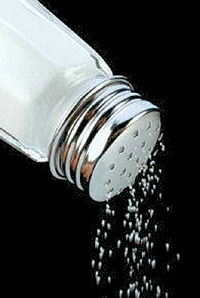- California Assembly OKs highest minimum wage in nation
- S. Korea unveils first graphic cigarette warnings
- US joins with South Korea, Japan in bid to deter North Korea
- LPGA golfer Chun In-gee finally back in action
- S. Korea won’t be top seed in final World Cup qualification round
- US men’s soccer misses 2nd straight Olympics
- US back on track in qualifying with 4-0 win over Guatemala
- High-intensity workout injuries spawn cottage industry
- CDC expands range of Zika mosquitoes into parts of Northeast
- Who knew? ‘The Walking Dead’ is helping families connect
Teens advised to cut sodium
By Yoon Ja-young
Diabetes, heart disease, and high blood pressure used to be called “adult disease” in Korea, but doctors started using the term “lifestyle disease” instead from a few years ago. They did so to stress that these diseases have more to do with bad lifestyles rather than age.
In fact, a large number of teenagers and children are suffering from lifestyle diseases in the country, due to diets that include less fiber, more meat, high calories and fast food.
According to the Health Insurance Review and Assessment Service, some 47,000 teenagers and children are treated for such diseases a year, costing 12.6 billion won, and the expenditure is increasing each year.
The Korea Health Promotion Foundation therefore announced dietary tips for teenagers so that they can avoid falling victim to a lifestyle disease.
It stresses that salty food increases the likelihood of lifestyle disease and obesity, which are becoming serious problems in Korea with 9.7 percent of children and teenagers categorized as obese in 2011.
Sodium is an essential nutrient for health and life, but excessive intake for prolonged periods leads to cardiovascular diseases, strokes, reduction in bone density, fall in kidney function and obesity.
An analysis on the correlation between sodium intake and obesity showed that the top 20 percent in terms of salty food intake had an 80 percent higher obesity risk compared with the bottom 20 percent.
The problem is that Koreans generally consume too much sodium. Koreans eat 4,831 milligrams of sodium daily, which is 2.4 times more than the 2,000 milligrams recommended by the World Health organization. A 1,200 milligram cut in daily sodium intake decreases the risk of hypertension, heart disease or stroke by between 30 and 43 percent, according to the Korean Dietetic Association. Twelve hundred milligram of sodium is equivalent to three grams of salt.
“They also should eat more fresh vegetables and fruits to prevent lifestyle diseases. As they contain vitamins, minerals, fiber and diverse antioxidants, they help prevent cardiovascular diseases and obesity,” the foundation said in the statement.
Research showed that teenagers who eat fruit less than once a day on average had two or three times larger increase in body mass index (BMI) during a one-year period compared with those who ate fruit once or more every day.
The World Health Organization recommends eating 500 grams of vegetable and fruits daily, but only two out of 10 Korean children meet this recommendation.











![일본 사도광산 [서경덕 교수 제공. 재판매 및 DB 금지]](http://www.koreatimesus.com/wp-content/uploads/2024/07/PYH2024072610800050400_P4-copy-120x134.jpg)


